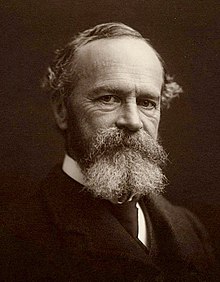
On the critical question of the relationship between the mind and the brain, James seemed to have two distinct views.
Sometimes he was a sort of dualistic interactionist. Not of course in a Cartesian sense, in which the "ego" is a soul, an enduring substance. But in a distinct sense of his own in which the ego is a "stream of consciousness" consisting of a series of overlapping pulses of attention, each appropriating the pulses that came before it. THIS self seems to be immaterial in some of James' tellings, even a potential candidate for survival after death, hence his concern with Leonora Piper and all that. Further, this mind/self seems to interact with the brain, in both directions. James doesn't know how that is possible, but isn't concerned unduly by that, since he sees causation itself as a mystery, so brain/mind interaction isn't ESPECIALLY mysterious.
In other contexts and passages, though, James was a monist. There is only one stuff, which he calls "pure experience." The brain is one hypothesis that develops as pure experience builds on itself and becomes capable of formulating hypotheses. Matter is another, and broader, hypothesis. Likewise, an immaterial mind is a way of carving up this experiential world, too. None has any privileged status. THIS is the James who denied that consciousness exists and who gave rise to the American "neorealists" like Holt and Perry.
Questions, first: do I have this right or is my crude exegesis all wrong? Second, if I am at least roughly right, which the the two James' is the better philosopher? Or do we wish to prize the ambiguity? Third, when did the literary set seize upon the expression "stream of consciousness" anyway...?
Wikipedia "Stream of consciousness (narrative mode)" states, "in 1918 May Sinclair first applied the term stream of consciousness, in a literary context, when discussing Dorothy Richardson's novels." It does not state whether this use of the phrase caught on.
ReplyDeleteYour penultimate paragraph raises two questions for me. First, isn't it contradictory for a monist to speak of an immaterial mind? Second, how can ANYONE deny consciousness? We all know that we are conscious whenever we are conscious.
I realize that a monist could consistently believe in an immaterial mind, if, like Berkeley, he denied the existence of matter. But James did not deny the existence of matter.
ReplyDeleteMonism in the relevant sense is monism about the bottom layer of "stuff." The turtle beneath all other stacked turtles, so to speak. For James in ONE of his metaphysical/speculative moods, there was only one such stuff and it was "pure experience." That is not a very apt name, but other "neutral monists" built on the idea in the subsequent years, including Bertrand Russell. At any rate, this is a very complicated nest of questions and I'll come back to it another day.
ReplyDeleteChristopher, I think that I see what you mean. Even though the mind is a function of the brain and could not exist without the brain, it is immaterial in a sense. The connections between neurons that create consciousness (the bottom layer, so to speak) are not themselves consciousness.
ReplyDeleteHenry, what you are describing would be a materialistic monism, which may include consciousness as a "supervenience" -- a set of properties that is in some sense distinct from but that depends entirely upon the deeper materialistic facts.
ReplyDeleteBerkeley's view, on the contrary, might be called a mental monism, and he might be said to have treated the properties of material bodies as supervenient (though he of course didn't use the term.)
What James was trying to get at in some of his writings was a NEUTRAL monism, in which the bottom later is neither mental nor physical, consisting neither of thoughts nor of things,and BOTH of the sides of traditional mind-body dualism, though real, are supervenient.
http://plato.stanford.edu/entries/neutral-monism/
Christopher, a materialistic monist (at least me) would not deny the existence of consciousness, so I agree that consciousness is supervenient. But I thought that Berkeley would deny the existence of material bodies, and therefore would not see them as supervenient, but as illusions. Am I wrong?
ReplyDeleteI was thinking when I wrote this of a particular passage from Berkeley's work that I only vaguely remembered and am now unable to find. So I can't quote it to you. My impression, though, is that Berkeley said something like this "That the objects we eat, live amongst, and adorn ourselves with, exist, really exist, I make no question." He was trying to say that he was the defender of common sense on such matters, and it was Locke and his ilk who were the paradoxical metaphysicians, not the other way 'round. I think in the same spirit (no pun intended) Berkeley would have embraced a "supervenience" view of such ordinary objects as tables, loaves of bread, and textiles.
ReplyDelete